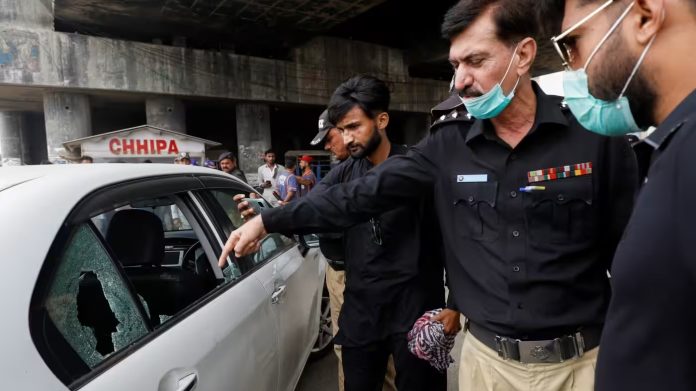ISLAMABAD — Pakistan is strengthening security for Chinese nationals working in the country as Beijing pressures Islamabad to do more to protect them from militants.
The Pakistani Interior Ministry held a high-level security meeting late last week and decided that strict protocols for Chinese personnel working on Belt and Road Initiative (BRI) projects should also apply to experts and investors involved in unrelated endeavors. The new procedures require these individuals to register their residential addresses with local police and ensure that they only travel in bulletproof vehicles.
Pakistan is home to the China-Pakistan Economic Corridor (CPEC), a $50 billion component of BRI. But Pakistani officials told Nikkei Asia that during caretaker Prime Minister Anwaar ul-Haq Kakar’s visit to China in October, Beijing specifically asked Islamabad to provide security to Chinese personnel not working on CPEC as well.
A Chinese readout of the Kakar-Xi meeting said Beijing “expects the Pakistani side to ensure the safety of Chinese institutions and personnel in Pakistan.”
Repeated attacks and threats against Chinese interests in Pakistan have long been a contentious issue. A security official familiar with the developments, who did not want to be named, said the decision to beef up safeguards is based on intelligence about possible attacks by the Pakistani Taliban and separatists in the province of Balochistan, where key CPEC projects are located, including the southwestern port of Gwadar.
“We have received intercepts that forces hostile to Pakistan will target Chinese nationals [using Baloch separatists] to sabotage CPEC in a bid to damage Pakistan’s economy,” the official said.
In August, a convoy of Chinese engineers was ambushed by Baloch separatists in Gwadar. The group escaped unhurt thanks to the bulletproof windows of the van transporting them.
Abdul Basit, a research fellow at the S. Rajaratnam School of International Studies in Singapore, told Nikkei Asia that deteriorating security in Pakistan was forcing Islamabad to take action. He said the recent attack in Gwadar was a reminder that “bulletproof cars help in protecting lives.”
But insisting on armored vehicles for a wider range of Chinese personnel will significantly increase security costs. Experts believe cash-strapped Pakistan will find it difficult to bear the added expense on its own, but it is unclear whether China will pitch in.
Kiyya Baloch, an independent analyst who tracks violence in Balochistan, told Nikkei that if every Chinese investor is provided an armored vehicle and a security detail, the costs could outweigh their investments.
Most agree that the danger is rising.
Baloch separatists — who aim to carve out their own homeland and have targeted Chinese nationals in recent years as a way of undermining the central government — are currently consolidating forces. Two key groups, the Baloch Liberation Front (BLF) and Baloch Liberation Army (BLA) Bashir Zeb Faction, have told the media that they are in the final stages of a merger.
The two already belong to the Baloch Raji Ajoi Sangar alliance, which has claimed responsibility for most of the attacks on Chinese interests in Balochistan and Karachi.
Baloch separatists condemn China as a colonial force that wants to exploit resources and the port of Gwadar.
Malik Siraj Akbar, a political analyst in Washington, said Baloch separatist groups view China’s continued presence in Balochistan — despite past warnings and attacks — as a litmus test.
“They need the merger to better use their resources and carry out attacks that draw more attention to their opposition to the Chinese presence in the area,” he said.
The analyst Baloch worries that the merger could lead to new attacks on Chinese-led projects. “Currently, nine separatist militant groups are operating in Balochistan, and if the merger of BLA and BLF becomes successful, then many smaller groups can also join them making the new group more lethal,” he said.
Experts doubt that the latest security upgrades will discourage the militants.
“The Baloch armed groups believe that the more they propagate their ‘war against China,’ the more support they will get from international players who have issues with Beijing,” said Akbar, the analyst in Washington.









































